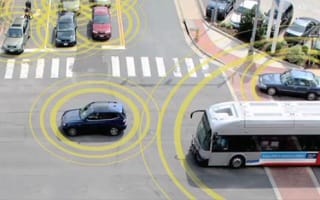Real-life smart-car test a 'game-changer' for transport

 It’s the largest smart-vehicle test of its kind ever conducted: some 3,000 cars, trucks and buses in Ann Arbor, Michigan, are now “talking” to one another in an unprecedented test to see how wireless technology could help improve traffic safety.
It’s the largest smart-vehicle test of its kind ever conducted: some 3,000 cars, trucks and buses in Ann Arbor, Michigan, are now “talking” to one another in an unprecedented test to see how wireless technology could help improve traffic safety.
The just-launched Safety Pilot Model Deployment is designed to be a year-long test of smart-car technology in the real world. The test involves wirelessly connecting not only vehicles but traffic lights and signals across a part of northeast Ann Arbor.
“Connected vehicle technology has the ability to address as much as 80 percent of crashes of unimpaired drivers and greatly reduce carbon emissions,” said Peter Sweatman, director of the University of Michigan Transportation Research Institute (UMTRI). “We also believe connected vehicle technology will influence new economy startups and innovation into the existing industrial base.”
The $22-million smart-car experiment is being led by UMTRI in partnership with the US Department of Transportation (USDOT).
During the pilot, smart-tech-equipped vehicles and traffic infrastructure will both transmit and receive data on vehicle position, speed and direction. When conditions for a potential accident are identified — sudden braking of a nearby vehicle, for example — drivers will be alerted with a visual or audible warning.
“This is a game-changer for transportation,” said Jim Sayer, an associate research scientist at UMTRI who’s managing the test program. “There are many safety and convenience applications to this, as well as applications related to mobility and sustainability.”
The USDOT plans to use the data gathered during the test period to help make better regulatory and policy decisions. Information will also be provided to the transportation industry to help guide future strategies for vehicle safety, mobility and environmental sustainability.




